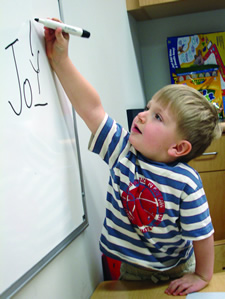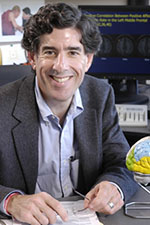
The Center for Healthy Minds is using science to develop mindfulness techniques to teach children joy and to focus their attention.
Imagine kindness and compassion were skills school children could learn as easily as they memorize math formulas.
Imagine returning Iraq veterans learned techniques to quiet their minds and offset the worst effects of post traumatic stress syndrome.
Imagine teen-agers, whose brain regulatory circuits are not fully developed, could be taught to manage their emotions and attention.
At the new Center for Healthy Minds (CHM) in the University of Wisconsin-Madison’s Waisman Center, neuroscience pioneer Richard Davidson and his colleagues believe all these things can happen.
Research is showing that attention, compassion and pro-social behavior are regulated by key circuits in the brain, Davidson said. “Those circuits are plastic: They can be changed through circumstance and training.” The Center will use laboratory evidence about how healthy qualities develop in the brain to map out interventions and techniques that can help children and adults learn to be happier.
“By developing and offering interventions for schools, hospitals, prisons and communities, we hope to create real change for society,” Davidson said.
“This is just allowing yourself a quiet time inside. So many children don’t have that skill, so they don’t notice the wonderful things in their lives because they’re whizzing past them.”
Joan Erschler, program director of the Waisman Early Childhood Program
Joan Erschler, program director of the Waisman Early Childhood Program, applauds the research. “I think it’s a huge unknown possibility for working with kids, especially since kids lead frenzied lives these days,” she said. She was among the Waisman teachers who participated in mindfulness-based stress reduction classes hosted by the Center.
“We came out feeling better about ourselves and better about working together, which made us better working with the kids,” Erschler said. Several teachers took the techniques into the classroom, adding mindfulness before naptime, breathing and body awareness, yoga and belly laughs to teach students to relax. “It focused children,” Erschler said. “This is just allowing yourself a quiet time inside. So many children don’t have that skill, so they don’t notice the wonderful things in their lives because they’re whizzing past them.”
Veterans need resources to deal with the physical and emotional effects of war, Vietnam veteran Jim Roseberry said. A 20-year meditation practitioner, he recently participated in a short breathing workshop through the Center. The breathing techniques have given him another way to still his mind and help him sleep.
Before he learned the breathing technique, Todd Dennis, co-founder of the Madison Iraq Veterans Against War, would typically hit snooze when his alarm went off. Now, he’s awake a half hour before the alarm. “You wake up ready to take on the world instead of groggy,” he said.
War can leave veterans angry and anxious, Roseberry said. “Like all traumas, you really need resources to help you find skillful practices in your daily life, so you find joy and compassion for yourself and joy and compassion for others.”
Healthy Minds scientists and staff have begun working with the Madison School District, veterans groups and the state Department of Corrections to introduce contemplative techniques to students, veterans and inmates and measure the effects.
Lisa Flook and Laura Pinger are designing ways to teach preschool children and fifth graders to resolve quarrels, feel peaceful, deal with anger in a healthy way and participate in healthy communities. Children, for example, might be encouraged to do a kind deed and tune into how it makes them and the other person feel. Older students might be asked to monitor their thoughts and what anxiety feels like and learn how to focus on their breathing to bring their attention back to what’s happening now.
“Why wait until people have suffered from stress into adulthood?” Flook said. “We can start with these children at a very young age.”
Helping children and teachers may change communities, Pinger added. “Energy generated around positive qualities is exponentially increased as more people become involved.”
“If [young men and women returning from war] can learn to regulate their emotions more effectively, these side effects may be prevented or at least alleviated.”
Emma Seppala
Emma Seppala has been working with veterans, especially those returning from Iraq. The pre-frontal cortex that regulates emotion doesn’t mature until people are 25, so she looks for meditation-based practices that may strengthen emotional regulation skills. Veterans with post traumatic stress syndrome who participated in early studies told Seppala that the breathing exercises helped them feel calm for the first time they could remember.
“Many young men and women returning from war suffer from the side effects of trauma that can include depression, anxiety, substance abuse, suicide and violent behavior toward others,” she said. “If they can learn to regulate their emotions more effectively, these side effects may be prevented or at least alleviated.” Seppala hopes to test and compare several practices to determine who will best benefit from each of them.

A challenge from the Dalai Lama led Professor Richard Davidson to study healthy qualities of mind.
The Center’s work is rooted in the Dalai Lama’s 1992 challenge that Davidson bring the rigorous techniques used to study negative qualities of mind to bear on the positive qualities of healthy minds. Davidson, also the director of the Waisman Laboratory for Brain Imaging and Behavior, has documented how meditation is linked to physical changes in the brains of Buddhist monks who show exceptional levels of well being and happiness. He also documented that even preliminary meditation practice will change the brain. With CHM, the research will be translated into scientifically backed practices to encourage kindness, compassion and happiness in children and adults.
The Center is important because it will spread information about healthy minds beyond the scientific community, said Ulco Visser, founder of the Impact Foundation, which helped launch CHM. The Impact Foundation’s goal is to reintroduce contemplation into the mainstream through the secular integration of wisdom traditions and scientific rigor. “I hope the Center will set the gold standard in this emerging field,” Visser said.
For more information
 World-renowned UW psychology professor Richard Davidson is searching for the source of happiness, and he has used Buddhist monks in his lab as a model group. Learn what he has discovered about the secrets and brain science of happiness.
World-renowned UW psychology professor Richard Davidson is searching for the source of happiness, and he has used Buddhist monks in his lab as a model group. Learn what he has discovered about the secrets and brain science of happiness.
